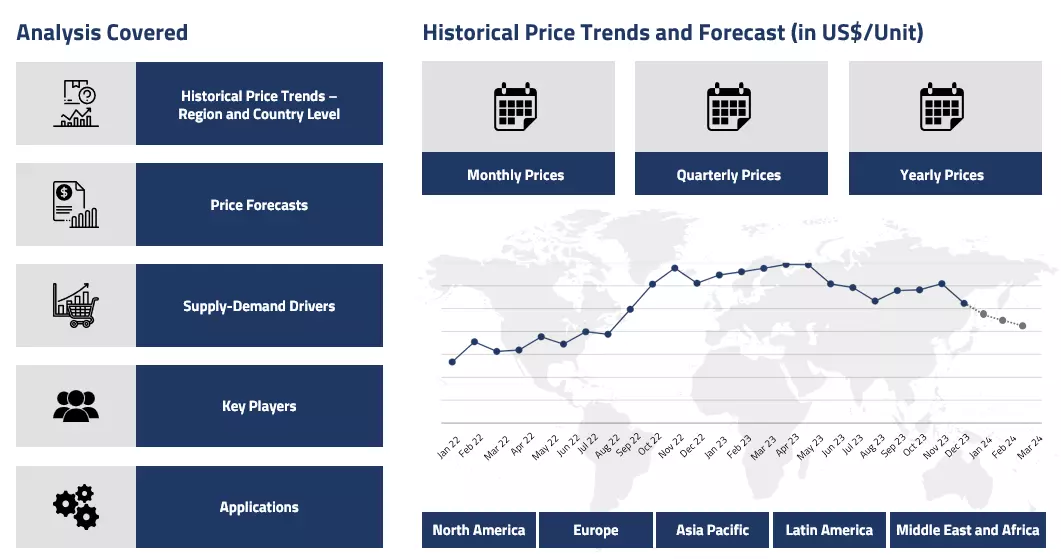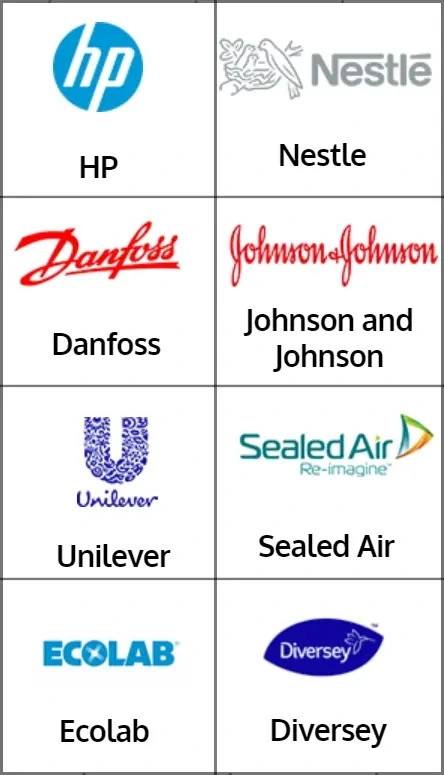Product
Biotin Price Trend and Forecast
Biotin Price Trend and Forecast
Biotin Regional Price Overview
Get the latest insights on price movement and trend analysis of Biotin in different regions across the world (Asia, Europe, North America, Latin America, and the Middle East & Africa).
Biotin Price Trend for the Q4 of 2024
In Q4’24, Biotin prices experienced an upward trend due to a combination of increasing demand and tightening supply. This was particularly evident in Europe and the U.S., where various factors contributed to the price surge. In Europe, Biotin prices saw a rise as consumer sentiment improved, spurred by a stable economic outlook and a drop in inflation. This shift in consumer behaviour led to higher demand for products like Biotin, which, in turn, put upward pressure on prices. Additionally, the approach of China’s Golden Week holiday led to businesses rushing shipments before potential delays caused by factory closures and slower port operations, further contributing to the price rise.
Biotin Price Chart

Please Login or Subscribe to Access the Biotin Price Chart Data
In the U.S., the rise in Biotin prices was largely due to heightened consumer confidence, which led to stronger demand across the market. Retailers also took proactive measures in response to the risk of labour strikes on the East and Gulf Coast ports, leading to increased stockpiling of Biotin to ensure supply continuity. This pre-emptive action, coupled with strong demand, created additional strain on the already-constrained supply chains, driving prices higher.
Analyst Insight
According to Procurement Resource, Biotin prices are expected to remain elevated in the short term due to sustained demand and potential logistical challenges, particularly in the U.S. The market will likely experience continued volatility, with risks tied to supply chain disruptions and shifts in consumer sentiment.
Biotin Price Trend for the Q3 of 2024
The prices of biotin fluctuated but remained within a defined range during the third quarter of 2024. For most of the three-month period, prices were steady, with occasional fluctuations caused by supply disruptions, and logistical challenges. Biotin prices had been low for an extended period, allowing buyers to secure supplies at lower rates.
Downstream industries such as supplements and skincare had already purchased stock and built inventories, leading to a dip in buying activity, as the market later quieted even more. To counter this sluggish market, some producers tried to raise the prices, which ultimately stabilized.
The hurricane season in North America, which typically affects supply channels, had a limited impact on this sector. Despite steady consumer demand, subdued upstream cost support caused prices to fluctuate in the market. Additionally, a plant explosion at BASF's Ludwigshafen facility in Germany in August temporarily halted operations. While this incident led the company to declare force majeure for vitamin A and E production, However, it is unlikely to have a significant impact on vitamin prices in the long term but affected the supply outputs temporarily. Overall, mixed market sentiments were witnessed.
Analyst Insight
According to Procurement Resource, the price of biotin is expected to remain steady and not showcase dramatic changes in the coming quarter. The logistical challenges arising due to approaching winter season may affect the supply of the commodity.
Biotin Price Trend for the Q2 of 2024
Biotin's price trajectory in the second quarter of the year 2024 was not much different from its performance in the first quarter of the year 2024. The market was observed to be more consolidated and range-bound this time around since the supply and demand dynamic suggested negligible modification in the upstream and downstream market equations.
The biotin market continued its reliance on the feedstock corn starch and other carbohydrate base materials prices. In Asian markets, particularly India and China, the biotin prices were found to mimic the sluggishness in the corn markets. Since the raw materials were available easily at affordable costs, the manufacturing costs remained muted for the major part.
At the same time, the downstream market demands were also very regular. The domestic market was still somewhat supportive; the export queries had taken a bit hit, especially from the European nations. Various logistical and supply related challenges were the roadblocks in the European trade equations. Overall, the markets there remained dull for the most part.
The US biotin market also didn't exude any desirable enthusiasm. With steady consumer demands and subdued upstream cost support, the biotin prices remained buoyant in the American markets as well. Overall, a tepid price curve was observed for biotin during the concerned time span.
Analyst Insight
According to Procurement Resource, Biotin prices are not expected to showcase any dramatic changes in the coming months. The supply and demand dynamics is likely to waver around similar periphery.
Biotin Price Trend for the Q1 of 2024
Biotin or Vitamin B7’s production involves a fermentation process with suitable microorganisms and then further downstream steps of purification, condensation, etc. The efficiency and affordability of this process determine the upstream price trajectory for biotin in the international markets. Corn feed and other sugar sources that are used as base materials for fermentation processes also affect the pricing situation for biotin. During the first quarter of 2024, biotin prices mostly observed an upward-wavering trajectory.
Along with a rise in the feedstock costs, the downstream demands have been equally supportive of the rising market trajectory. Especially in the post-Covid era, people have started taking their health seriously. Along with the pharma, the nutraceutical industry has also been flourishing. The nutraceutical sector has emerged as one of the biggest consumers of biotin. With hair and skin issues rising in most populations of the world, biotin consumption has also been included as a supplement. Overall, positive market sentiments were witnessed in Q1’24.
Analyst Insight
According to Procurement Resource, given the current demand patterns the Biotin price trends are likely to continue rising in the coming months as well.
Biotin Price Trend for the October - December of 2023
The biotin market experienced some downsizing during the last quarter of the year 2023. The biggest downfall of the demands came from healthcare and the skincare sectors. Biotin, which is also popularly known as Vitamin B7, is produced using cyclic amines and potassium borohydride, and both feedstocks were readily available during the concerned period.
The industrial slump in the USA earlier this year because of weak economic circumstances in the region kept the unused stocks stacked up in inventories, and that further created cost pressure for suppliers. So, in order to vacate inventories and make space for fresh stocks the suppliers chipped down the biotin prices. Overall, dull and falling price trend were observed for biotin throughout the entire three-month span of Q4 of 2023.
Analyst Insight
According to Procurement Resource, Biotin price trend are not likely to recover anytime soon as the demands are facing downward and the inventories are running high; prices are likely to waver along the lower side of the price curve.
Biotin Price Trend for July - September of 2023
Biotin belongs to the family of water-soluble B vitamins with excessive employability in the pharmaceutical and cosmetic industries. It is naturally obtained from food sources such as eggs, nuts, and vegetables and synthetically from the bacteria culture.
Biotin’s price trend, thus, are dictated by its industrial uses and methods of production. The cost of natural raw materials used in its production in India surged due to a variety of factors. The most significant contributor to this rise in prices was uneven rainfall and ill consequences of climate change observed in the agricultural sectors. To curb these rising rates of inflation in the food sector, the government took strict measures, such as an export ban, which helped stabilize the trajectory of the biotin price graph in the third quarter of 2023.
Analyst Insight
According to Procurement Resource, the price of Biotin is expected to trace an oscillating trajectory in view of the government’s efforts to control inflation in the food sector.
Biotin Price Trend for the First Half of 2023
Asia
The price trend of biotin fluctuated throughout the first and second quarters of 2023, as there was a considerable decline in the demand from the downstream industries. In the first quarter, China strengthened its export rates and eased its trade policies that, boosted the international offtakes.
In the second quarter, however, the production activities declined along with the weak demand from the downstream industries and the low number of offtakes from the domestic and international traders. In addition to this, trade was also affected by the slow recovery of the Chinese economy after the pandemic and the ongoing struggling global markets due to the Russia-Ukraine crisis.
Europe
In European countries, the price trend of biotin showcased a mixed signal but majorly remained on the positive end as the imports from Asian countries became expensive due to the strengthening of Asian currency. In addition to this, the surge in demand from the end-user industries caused the level of inventories to decline and thus supported the rising trend of biotin prices. However, the trajectory of the biotin price trend slumped in the last phase of the second quarter.
The main causes of this decline were the reduction in the appetite of buyers, the rise in stockpiles of inventories, and the weak performance of the economy. In addition to this, inflation in food and energy prices also hampered the growth of the biotin price trend.
North America
The first quarter of 2023 proved to be unfavorable for the biotin market as its price trend declined consistently. The biotin market was adversely affected by the restricted trade, high inflation, and uncertainties in the energy production market caused by the Russia-Ukraine crisis.
In April, there was a slight rise in the prices as end-user industries presented large orders and slow supply chains failed to cater to this high demand. However, in the subsequent months, the decline in the prices of biotin was a direct consequence of the poor purchasing potential of buyers and high-interest rates.
Analyst Insight
According to Procurement Resource, the price trend of Biotin is expected to decline in the upcoming quarters. The market activities of biotin will be dependent on the demand from downstream industries and the efficiency of supply chains.
Procurement Resource provides latest prices of Biotin. Each price database is tied to a user-friendly graphing tool dating back to 2014, which provides a range of functionalities: configuration of price series over user defined time period; comparison of product movements across countries; customisation of price currencies and unit; extraction of price data as excel files to be used offline.
About Biotin
Biotin is also known as vitamin B7 which is an essential ingredient in various metabolic processes. It also acts as a coenzyme in the production of fatty acids, amino acids, glucose and also in energy production processes. It helps in the growth of skin cells, hair, and nails. It is also added to food sources and is also naturally obtained from eggs, nuts, and certain vegetables. Its deficiency can lead to skin disorders, hair loss, and other health issues, making it an important micronutrient for overall well-being.
Biotin Product Details
| Report Features | Details |
| Product Name | Biotin |
| Chemical formula | C10H16N2O3S |
| Industrial Uses | Wastewater treatment, Cosmetics and personal care, Agriculture, Food and beverage industry, Biotechnology |
| CAS Number | 58-85-5 |
| Synonyms | Vitamin B7 |
| Molecular weight | 244.31 g/mol |
| HS Code | 29362950 |
| Supplier Database | Church & Dwight Co Inc, Nestle S.A., Nutraceutical Corporation, Life Extension Foundation Buyers Club Inc, The Nature's Bounty Co |
| Region/Countries Covered | Asia Pacific: China, India, Indonesia, Pakistan, Bangladesh, Japan, Philippines, Vietnam, Iran, Thailand, South Korea, Iraq, Saudi Arabia, Malaysia, Nepal, Taiwan, Sri Lanka, UAE, Israel, Hongkong, Singapore, Oman, Kuwait, Qatar, Australia, and New Zealand Europe: Germany, France, United Kingdom, Italy, Spain, Russia, Turkey, Netherlands, Poland, Sweden, Belgium, Austria, Ireland Switzerland, Norway, Denmark, Romania, Finland, Czech Republic, Portugal and Greece North America: United States and Canada Latin America: Brazil, Mexico, Argentina, Columbia, Chile, Ecuador, and Peru Africa: South Africa, Nigeria, Egypt, Algeria, Morocco |
| Currency | US$ (Data can also be provided in local currency) |
| Supplier Database Availability | Yes |
| Customization Scope | The report can be customized as per the requirements of the customer |
| Post-Sale Analyst Support | 360-degree analyst support after report delivery |
Note: Our supplier search experts can assist your procurement teams in compiling and validating a list of suppliers indicating they have products, services, and capabilities that meet your company's needs.
Biotin Production Processes
The reaction of cyclic acid with dextroamine produces cyclic amine that on further reaction with potassium borohydride and hydrochloric acid gives a product which is combined with potassium thioacetate to give thioketone. In the next step, thioketone is reacted with formate reagent, and then is subjected to hydrogenation. Finally, via debenzylation, crude biotin is produced and by the help of charcoal, pure biotin is finally produced.
Methodology
The displayed pricing data is derived through weighted average purchase price, including contract and spot transactions at the specified locations unless otherwise stated. The information provided comes from the compilation and processing of commercial data officially reported for each nation (i.e. government agencies, external trade bodies, and industry publications).
Assistance from Experts
Procurement Resource is a one-stop solution for businesses aiming at the best industry insights and market evaluation in the arena of procurement. Our team of market leaders covers all the facets of procurement strategies with its holistic industry reports, extensive production cost and pre-feasibility insights, and price trends dynamics impacting the cost trajectories of the plethora of products encompassing various industries. With the best analysis of the market trends and comprehensive consulting in light of the best strategic footstep, Procurement Resource got all that it takes.
Client's Satisfaction
Procurement Resource has made a mark for itself in terms of its rigorous assistance to its clientele. Our experienced panel of experts leave no stone unturned in ensuring the expertise at every step of our clients' strategic procurement journey. Our prompt assistance, prudential analysis, and pragmatic tactics considering the best procurement move for industries are all that sets us apart. We at Procurement Resource value our clients, which our clients vouch for.
Assured Quality
Expertise, judiciousness, and expedience are the crucial aspects of our modus operandi at Procurement Resource. Quality is non-negotiable, and we don't compromise on that. Our best-in-class solutions, elaborative consulting substantiated by exhaustive evaluation, and fool-proof reports have led us to come this far, making us the ‘numero uno' in the domain of procurement. Be it exclusive qualitative research or assiduous quantitative research methodologies, our high quality of work is what our clients swear by.
Table Of Contents
Our Clients

Get in Touch With Us

UNITED STATES
Phone:+1 307 363 1045

INDIA
Phone: +91 8850629517

UNITED KINGDOM
Phone: +44 7537 171117
Email: sales@procurementresource.com

